 The most common group of problems that plague domesticated dogs and cats are conditions of the skin. Skin and coat problems include dry, itchy, red or irritated skin, hair loss, “hot spots,” unhealthy coats, feline acne, bumpy rashes, excessive shedding, pigment changes, smelly skin, and matting. Some of these issues are due to owner’s neglect. Matting, for instance, is primarily caused by insufficient grooming. But most skin conditions are directly related to your pet’s diet.
The most common group of problems that plague domesticated dogs and cats are conditions of the skin. Skin and coat problems include dry, itchy, red or irritated skin, hair loss, “hot spots,” unhealthy coats, feline acne, bumpy rashes, excessive shedding, pigment changes, smelly skin, and matting. Some of these issues are due to owner’s neglect. Matting, for instance, is primarily caused by insufficient grooming. But most skin conditions are directly related to your pet’s diet.
Good nutrition is the cornerstone of healthy fur and skin, as well as being the best preventative against diseases of all kinds. If you are experiencing any kind of skin or coat problem, even if it’s just dandruff, read the section on Diet. Pets who eat a well-balanced, raw meat diet have beautiful coats and receive a continuous flow of compliments because of it.
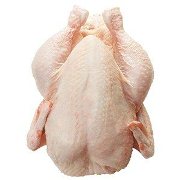 Be aware, though, that your pet will go through a transitional process when switching to a new, natural food. There may be a short period of time when things seem to get worse instead of better. This is because the body is eliminating toxins, rather like a cleanse, and the skin is the body’s largest elimination organ. This is the same reason why dogs and cats develop skin conditions in the first place. The transitional period shouldn’t last more than a couple of weeks, and may only last a day or two. Other bodily changes may occur during this time, such as temporary diarrhea.
Be aware, though, that your pet will go through a transitional process when switching to a new, natural food. There may be a short period of time when things seem to get worse instead of better. This is because the body is eliminating toxins, rather like a cleanse, and the skin is the body’s largest elimination organ. This is the same reason why dogs and cats develop skin conditions in the first place. The transitional period shouldn’t last more than a couple of weeks, and may only last a day or two. Other bodily changes may occur during this time, such as temporary diarrhea.
As well as filtering toxins from the inside out, the skin is also susceptible to any external substances that your pet comes into contact with. It’s no wonder that skin problems are the number one reason cats and dogs are brought in to see veterinarians.
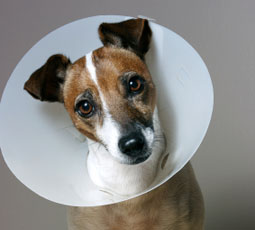 Don’t give your pet steroids to clear up a skin or coat problem. This is the usual treatment prescribed by conventional veterinarians. Repeated drug use can cause much more serious illnesses and can critically impair vital internal organs. If your pet’s skin condition is not too serious, you ought to try switching to a natural diet. If your dog or cat has already been on steroids, or if the condition is serious, see a holistic veterinarian.
Don’t give your pet steroids to clear up a skin or coat problem. This is the usual treatment prescribed by conventional veterinarians. Repeated drug use can cause much more serious illnesses and can critically impair vital internal organs. If your pet’s skin condition is not too serious, you ought to try switching to a natural diet. If your dog or cat has already been on steroids, or if the condition is serious, see a holistic veterinarian.
In addition to being given steroids, all too frequently pets with skin conditions are diagnosed by conventional veterinarians as having allergies. Of course, some pets do have food allergies, but most of the time the problem is a food intolerance, which is different. Many dogs and cats have  developed food intolerances to corn and wheat because poor, cheap grains are overused as fillers in commercial pet foods. You may need to eliminate grains – particularly wheat and corn – from your pet’s diet, but this is not always necessary. Read the section on Allergies. And don’t decide to feed your pet only meat, as this is not balanced, either, and can cause other problems.
developed food intolerances to corn and wheat because poor, cheap grains are overused as fillers in commercial pet foods. You may need to eliminate grains – particularly wheat and corn – from your pet’s diet, but this is not always necessary. Read the section on Allergies. And don’t decide to feed your pet only meat, as this is not balanced, either, and can cause other problems.
The core principal behind holistic medicine is that the root of the problem should be treated, as opposed to focusing treatment on individual symptoms. In his book Dr. Pitcairn’s Complete Guide to Natural Health for Dogs and Cats, Dr. Richard Pitcairn says that conventional medicine tends to view each skin condition as a problem of its own. Dr. Pitcairn believes it’s best to recognize that a pet with an inflamed hotspot and a pet with smelly skin secretions are both displaying symptoms of the same underlying problem. He outlines these as typical causes:
- Toxicity – probably most of it from poor-quality food and some of it from other sources, like environmental pollutants and deliberately applied pest control chemicals
- Vaccinations – inducing immune disorders in susceptible animals
- Suppressed Disease – remains of an inadequately treated condition that never was cured and that may periodically discharge through the skin
- Psychological Factors – boredom, frustration, anger, and irritability
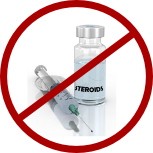 Dr. Pitcairn adds that skin problems may be alleviated or eliminated through fasting, proper nutrition, and a healthy environment and lifestyle. Details of such a lifestyle are described throughout this website. He also says that “the most difficult to treat are those previously dosed with lots of cortisone or its synthetic forms,” some of which include cortisone, hydrocortisone, azium, depo, prednisone, prednisolone, flucort or fludrocortisone, methylprednisolone, paramethasone, betamethasone, and dexamethasone. Basically if the generic name of the drug ends in “one” (pronounced like “zone”) it’s probably a steroid.
Dr. Pitcairn adds that skin problems may be alleviated or eliminated through fasting, proper nutrition, and a healthy environment and lifestyle. Details of such a lifestyle are described throughout this website. He also says that “the most difficult to treat are those previously dosed with lots of cortisone or its synthetic forms,” some of which include cortisone, hydrocortisone, azium, depo, prednisone, prednisolone, flucort or fludrocortisone, methylprednisolone, paramethasone, betamethasone, and dexamethasone. Basically if the generic name of the drug ends in “one” (pronounced like “zone”) it’s probably a steroid.
Parasites are also a common cause of skin problems. Most pet owners have had experience with fleas, but ticks, lice, and mites can also be problematic. Mange is caused by mites and the symptoms include broken hair and tiny skin bumps. See the Parasites section for more information. If the hair loss, redness, and raised skin are in circular patches, your pet may have ringworm, which is a fungus. See the Ringworm section.
If switching to a natural diet doesn’t cure the skin condition, do a thorough examination of your pet’s environment. This can include everything from air quality to plants around the house to pesticides used in your neighborhood.
Feline acne is marked by small bumps around the chin that resemble pimples. Holistic veterinarians have cured many of these cases simply by switching the type of food bowl and the type of food. 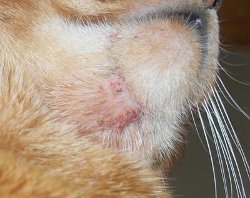 Food bowls should be stainless steel, glass, or ceramic without any toxic paints on them. You may also need to clean your cat’s chin every night. Antiseptic wipes have been known to help. Povidone-iodine (Betadine) is a very good antiseptic, but it will stain light colored fur. Chlorhexidine is another good antiseptic.
Food bowls should be stainless steel, glass, or ceramic without any toxic paints on them. You may also need to clean your cat’s chin every night. Antiseptic wipes have been known to help. Povidone-iodine (Betadine) is a very good antiseptic, but it will stain light colored fur. Chlorhexidine is another good antiseptic.
While your pet’s skin condition is improving through improvements in its environment and food, the following are some natural therapies you can administer to help.
Herbal and Naturopathic Help
Begin with a fast, following the guidelines described in the section on Fasting. This helps the body to eliminate toxins. Once you’ve gradually introduced solid foods back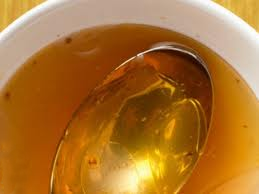 into your pet’s diet, feed only once or twice a day. Don’t give snacks between meals. And of course, as described above, feed a well-balanced, raw diet.
into your pet’s diet, feed only once or twice a day. Don’t give snacks between meals. And of course, as described above, feed a well-balanced, raw diet.
Adding acidophilus and digestive enzymes can help. Apple cider vinegar and aloe vera have also been used by veterinarians to treat skin conditions. All of these are digestive aids, which help the body use the nutrients it takes in. You should also give your pet a multi-vitamin/mineral supplement, and extra vitamins C, E, zinc, and biotin. Certain oils, particularly high quality fish oils, supply essential fatty acids that are vital to skin health. Borage oil and flaxseed oil are also known to help an animal’s skin and coat. And horsetail is rife with silica, which strengthens fur. Be wary of giving too much vitamin E and fish oil, as excess can sit and build up in your pet’s system. See Dosage Guidelines. As always, it’s best to consult with a holistic veterinarian.
 Finely grated fresh fruits and vegetables of a variety of colors give your dog or cat a comprehensive range of antioxidants, which are beneficial in many ways. Selenium and alpha lipoic acid are potent antioxidants, as are the vitamins A, C, and E, and bioflavenoids. Vitamin A is abundant in fish oils. Your pet’s diet should also contain a small amount of kelp, which is important for thyroid health and is also good for an animal’s skin and coat.
Finely grated fresh fruits and vegetables of a variety of colors give your dog or cat a comprehensive range of antioxidants, which are beneficial in many ways. Selenium and alpha lipoic acid are potent antioxidants, as are the vitamins A, C, and E, and bioflavenoids. Vitamin A is abundant in fish oils. Your pet’s diet should also contain a small amount of kelp, which is important for thyroid health and is also good for an animal’s skin and coat.
In The Encyclopedia of Natural Pet Care, a solution of one tablespoon unrefined sea salt in one cup of water is said to help with the healing of “hot spots, irritated areas, and healing wounds.” CJ Puotinen describes a dog in obedience class who “suffered from a sore throat that wouldn’t heal despite repeated trips to the veterinarian. Her owner applied this salt solution and the sore improved the same day.” Puotinen also states that bee propolis tincture or liquid extract can be beneficial topically and internally, as a supplement.
And she informs readers that “licorice root and yucca contain natural cortisone and help relieve inflammation.” She explains that “licorice is specific for the adrenal glands, which are often stressed or depleted in pets with chronic coat problems.” Her dosing guidelines are to give one dropperful once daily for animals up to twenty pounds, and twice daily for larger animals.  This is to be done for one month, and then the dosage is to be cut in half for one week, and then tapered to every other day for one week – for a total of six weeks of therapy. Then the dosing is to stop for about five weeks, and then the pattern is to be repeated. We recommend you talk to a holistic veterinarian.
This is to be done for one month, and then the dosage is to be cut in half for one week, and then tapered to every other day for one week – for a total of six weeks of therapy. Then the dosing is to stop for about five weeks, and then the pattern is to be repeated. We recommend you talk to a holistic veterinarian.
Other herbs thought to help correct hormonal imbalances include Ashwagandha, ginseng, and schisandra.
To help with itchy skin while the body is in recovery, occasional oatmeal baths are helpful. Don’t use a pet shampoo, though. This could make the condition worse. For topical relief, try jojoba oil, aloe vera, or essential oil of lavender. The lavender oil is thought to act as an antiseptic, a soothing agent, and a pest repellent. 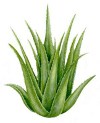 Aloe vera is an old favorite and an effective skin soother that helps speed up healing. Chamomile tea is also widely used to soothe and reduce inflammation. Brew it as you would brew a tea, but steep the herb well so the chamomile is highly concentrated. And, of course, make sure the liquid has cooled sufficiently before applying it on your pet.
Aloe vera is an old favorite and an effective skin soother that helps speed up healing. Chamomile tea is also widely used to soothe and reduce inflammation. Brew it as you would brew a tea, but steep the herb well so the chamomile is highly concentrated. And, of course, make sure the liquid has cooled sufficiently before applying it on your pet.
Poultices and compresses are also suitable for many acute skin conditions. Oatmeal can be used for itch, goldenseal for inflammation. See the section on Poultices for more information.
Homeopathy
There are too many types of skin problems and too many possible reasons for the symptoms. Homeopathy is specific, so an accurate diagnosis is important. Take careful note of your pet’s symptoms and consult with a naturopathic or homeopathic veterinarian.